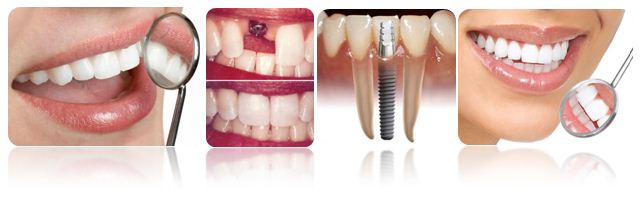Dental Implants
"The Ideal Replacement for Missing Teeth"
- Have you heard of implants to replace teeth?
- Did you think it is a luxury?
It may be more costly than other forms of tooth replacement, but when you consider how:
- It can save and preserve the remaining teeth, bone and gum
- It looks natural
- It improves enjoyment of food
You will appreciate why nowadays it is the standard treatment and the IDEAL treatment in the replacement of missing tooth / teeth. The overall dental health status has improved with the modern day dental health care and teeth are being preserved rather than removed. Nonetheless, teeth may be congenitally missing (born without a tooth or multiple teeth) or lost due to many reasons, amongst which are the following:
- Very gross caries making it impossible to restore
- Advanced periodontal (gum) disease
- Teeth lost in traumatic injuries
- Teeth removed due to the excision of a tumor
Replacement of Teeth:
While many may still view removal of teeth as a solution to their dental problems, it may turn out to be just the beginning of many more problems!
In the anterior (front) region, loss of even one tooth is severely distracting, besides causing problems in phonation.
Loss of posterior (back) teeth may cause problems in chewing. In cases where most of the posterior teeth are lost, there could be excessive stress on the front teeth resulting in their premature loss. Thus a replacement becomes essential.
Replacement with a removable denture is the most economical. However, it is not necessarily retentive or stable. When oral hygiene is less than ideal, the supporting teeth may become carious or mobile resulting in progressive loss of more teeth. In those totally edentulous (toothless) patients, full dentures, especially the lower ones, are a constant source of discomfort and discontent. The usual complaint is the difficulty in controlling a very mobile denture and the reduced chewing efficiency.
Bridges have the advantage of being fixed. However, it is necessary to prepare adjacent teeth for capping. Tooth decay or tooth fracture may result in failure of the fixed bridge.
Another problem with loss of teeth is the loss of supporting bone or alveolus. This progressive thinning of the bone may cause difficult in replacing the teeth in their original position.
Dental implants represent an important milestone in the advances in Dentistry. The past thirty years sees a tremendous development in this technology. The possibility of individual replacement of missing teeth in a predictable manner is the closest one could get to simulating or even replicating the natural state of the dentition. In addition to a fixed replacement of a tooth, it also stabilizes the status of the support bone, maintaining the bone volume. The biggest advantage is that the adjacent teeth are not cut down in any way and the maintenance of the tooth is no difference from the natural dentition.
Where multiple teeth are lost, a reduced number of strategically placed implants could be used to support bridges.
In fully edentulous situations, unstable dentures and inadequate chewing efficiency is the main problem. Implants can be used to provide support and retention for a removable over denture. It has the advantage of aesthetic appearance, firm and comfortable to chew on, yet easy to maintain. In ideal cases, fixed prosthesis can be constructed.



